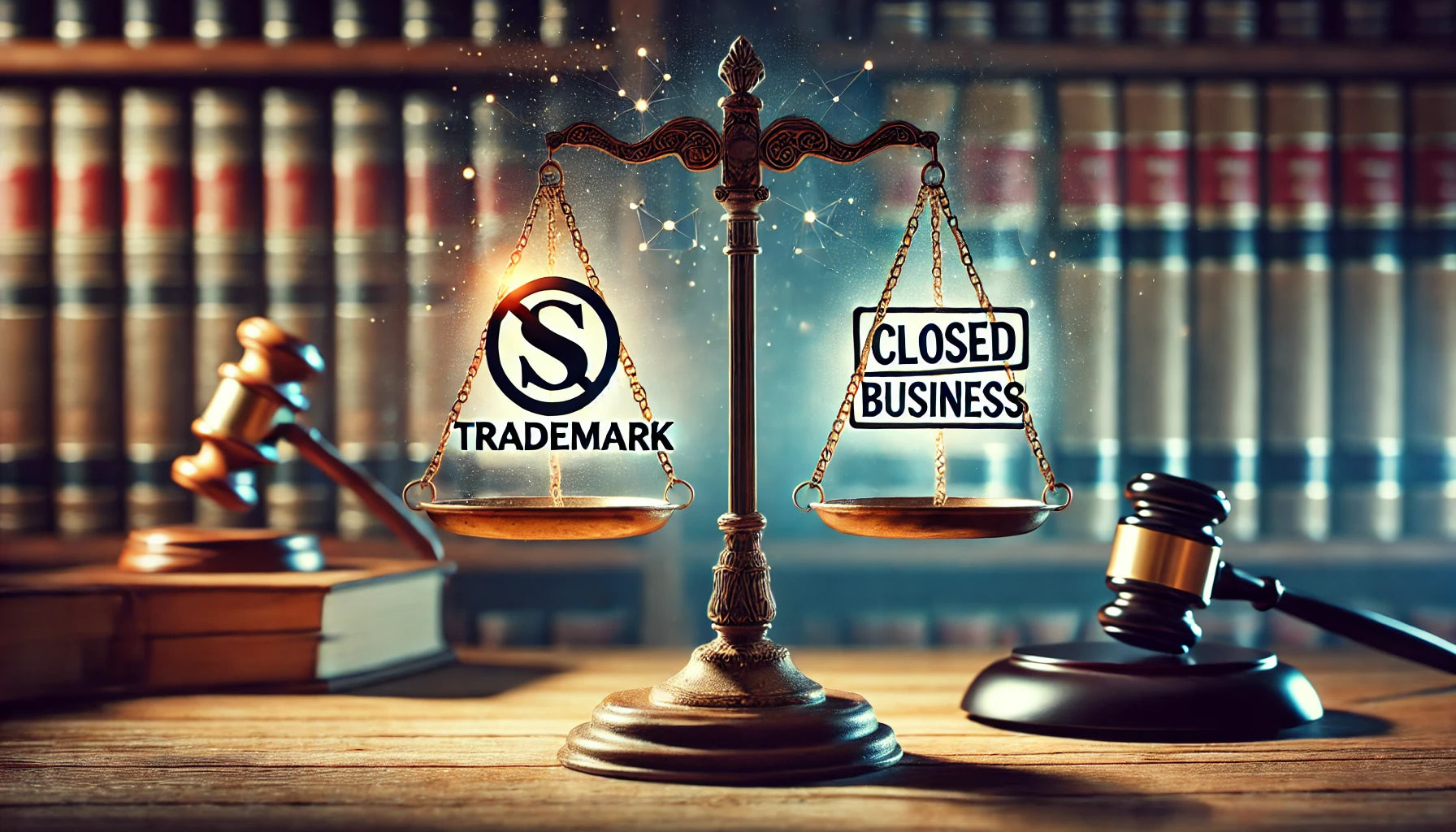Quick Overview
When a business closes, its trademarks don’t simply disappear or become public property. They remain legally protected assets tied to intellectual property law. Whether you can use a trademark from a closed business depends on several factors, including whether the trademark has been officially abandoned, sold, or maintained. Missteps could result in legal trouble, even if the original owner is out of business.

Common Questions & Answers
1. What happens to trademarks when a business closes?
Trademarks are considered assets, even after a business shuts down. These assets may be sold during bankruptcy proceedings, retained by the owner, or left inactive.
2. Can you use a trademark from a closed business?
Not immediately. You’ll need to confirm that the trademark has been officially abandoned or purchase the rights from the owner.
3. How do trademarks become abandoned?
A trademark becomes abandoned if its owner stops using it commercially and does not renew its registration. The timeframe for abandonment is typically three years.
4. Are trademarks sold during liquidation?
Yes, trademarks can be sold like other assets during bankruptcy or liquidation to help settle debts or provide value to creditors.
5. What risks come with using a defunct trademark?
If the trademark hasn’t been officially abandoned, its use can lead to infringement lawsuits. Always verify the status before taking any action.

Step-by-Step Guide: Can You Use a Closed Business’s Trademark?
Step 1: Check Trademark Status
Search the U.S. Patent and Trademark Office (USPTO) database to confirm if the trademark is abandoned or still active.
Step 2: Investigate Ownership
Determine whether the trademark was sold, assigned to a new entity, or retained by the original owner after closure.
Step 3: Look for Renewal Information
Review whether the trademark has been renewed. Active trademarks remain protected, even if unused.
Step 4: Contact the Owner or Administrator
Reach out to purchase the rights to the trademark if it hasn’t been abandoned or sold.
Step 5: Avoid Premature Use
Using a trademark before verifying its status can result in lawsuits or cease-and-desist orders. Always confirm legal clearance first.
For further advice, schedule a consultation with Devin Miller for expert insights on navigating trademarks.
Historical Context
Trademarks have long been protected assets in business law. The Lanham Act of 1946 solidified trademarks as intellectual property in the United States, ensuring their transferability even if businesses fail. Historical cases like the Kodak bankruptcy in 2012 highlighted the value of trademarks during liquidation. Kodak’s brand name alone attracted bidders despite the company’s financial decline, illustrating how trademarks can live on, regardless of the business’s fate.
The rise of global markets in the 21st century added complexities. A trademark might be abandoned in one jurisdiction but actively used in another. Businesses have learned to hold onto their intellectual property strategically, even after shuttering their doors.

Business Competition Examples
1. Toys “R” Us
Though the company declared bankruptcy in 2017, its trademarked brand name was retained and later revived under new ownership.
2. Blockbuster
Once a video rental giant, Blockbuster’s trademark is still owned but has become a nostalgic icon used sparingly for branding purposes.
3. Borders Bookstore
After its 2011 bankruptcy, Borders’ trademark remained dormant for years before being fully abandoned, allowing potential reuse.
4. RadioShack
After filing for bankruptcy, RadioShack’s trademarks were sold, enabling a rebranding and partial revival under new owners.

Discussion
Trademarks don’t fade into oblivion when a business closes. They often retain significant value, whether as assets for liquidation or symbols of nostalgia. A common misconception is that trademarks vanish after non-use, but the abandonment process is both deliberate and legal. Businesses navigating closure face choices: keep the trademarks for future ventures, sell them for quick cash, or allow them to expire.
The rise of trademark squatting—where individuals register defunct trademarks hoping to resell them—has added a layer of complexity. Brands like Toys “R” Us showcase how trademarks can outlive their businesses, creating opportunities for reinvention. Entrepreneurs must tread cautiously, ensuring they respect existing intellectual property laws before using or purchasing a defunct trademark.

The Debate
Side 1: Trademarks Should Be Public After Business Closure
Advocates argue that unused trademarks stifle innovation and block entrepreneurs from leveraging well-known names to build fresh ventures.
Side 2: Trademarks Are Private Property
Opponents claim that trademarks are intellectual property, deserving the same legal protections as physical assets. Public use without purchase would be unfair.

Takeaways
- Trademarks remain legally protected assets after a business closes.
- Abandoned trademarks are available for use, but abandonment takes time and legal confirmation.
- Trademark infringement risks are high without verification of legal status.
- Purchasing trademarks is often the safest way to use a defunct brand’s intellectual property.

Potential Business Hazards
-
Infringement Lawsuits
Using a trademark without proper clearance can result in costly legal disputes. -
Squatting Issues
Trademark squatters might attempt to profit by reselling unused trademarks, complicating legitimate purchases. -
Reputation Risks
Acquiring a defunct brand may also mean inheriting its negative public perception. -
Regulatory Delays
Confirming trademark status and purchasing rights can be time-consuming, potentially delaying business plans.

Myths and Misconceptions
-
"All closed business trademarks are free to use."
False. They remain protected until legally abandoned. -
"If a business doesn’t renew its trademark, it’s abandoned."
Not immediately. Abandonment typically occurs after three years of non-use. -
"You can register a closed business’s trademark easily."
Only if the original owner has no claim or hasn’t renewed it. -
"Bankruptcy erases trademark rights."
No, trademarks are often sold during bankruptcy to pay creditors.

Book & Podcast Recommendations
-
"Building a StoryBrand" by Donald Miller
An essential read on crafting a strong brand identity and understanding trademark value. -
"Trademark Like a Boss" Podcast
Learn about trademark law, registration processes, and common pitfalls. -
"The Art of Trademark" by Jane Fletcher
A detailed exploration of trademarks, intellectual property, and real-world cases. -
"The Trillion Dollar Trademark" Podcast
A fascinating dive into the power of trademarks in global markets.

Legal Cases
-
Kodak Bankruptcy (2012)
Kodak’s trademarks became a focal point in their bankruptcy auction, showing how trademarks hold value independently of the business. -
Blockbuster’s Trademark Retention (2010)
Even after ceasing operations, Blockbuster’s trademark was actively maintained, demonstrating strategic IP retention. -
Borders Trademark Abandonment (2011)
When Borders failed to renew its trademark, it became abandoned, opening opportunities for reuse. -
Toys “R” Us Revival (2017)
Despite bankruptcy, the trademark was retained, allowing the brand to reenter the market under new management.

Share Your Expertise
Want to learn how trademarks could impact your startup or business? Explore more resources at Inventive Unicorn.
![]()
Wrap Up
When businesses close, their trademarks don’t go free immediately. They’re valuable assets that require careful legal handling. By understanding trademark laws, entrepreneurs can avoid risks and potentially leverage these dormant brands for success.













